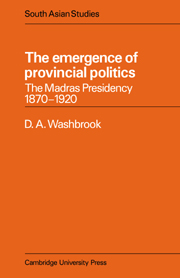Book contents
- Frontmatter
- Contents
- Preface
- Abbreviations, notes on references and spelling
- Introduction
- 1 The Madras Presidency
- 2 The governance of Madras
- 3 The political economy of Madras
- 4 Local structures of political power
- 5 The emergence of provincial politics
- 6 The vocabulary of communal politics
- 7 The Home Rule League, Justice Party and Congress
- Conclusion
- Glossary
- Bibliography
- Index
6 - The vocabulary of communal politics
Published online by Cambridge University Press: 21 September 2009
- Frontmatter
- Contents
- Preface
- Abbreviations, notes on references and spelling
- Introduction
- 1 The Madras Presidency
- 2 The governance of Madras
- 3 The political economy of Madras
- 4 Local structures of political power
- 5 The emergence of provincial politics
- 6 The vocabulary of communal politics
- 7 The Home Rule League, Justice Party and Congress
- Conclusion
- Glossary
- Bibliography
- Index
Summary
One result of the growth of the power of Fort St George, therefore, was the elongation of factional linkages. Political connections now stretched up from the town and village to men who were placed in the political institutions of the capital. Importantly, however, this development did not deeply disturb the previous categories of political existence. Local politicians, although using and abusing central influence, still derived the largest part of their power from the manipulation of local resources. Central politicians, although distributing a patronage to all sections of society, still derived this patronage from the manipulation of the offices of Fort St George. Centre and locality now were linked as never before, but each continued to maintain its own identity and its own separate personnel. In this sense, although the political system of Madras had been expanded in scale, it had not undergone any qualitative change. Parallel to the process of elongation, however, there emerged another and rather different process. Not only was power at the centre drawn from different sources to power in the locality and not only was it held by different people but also it was organised on wholly different principles. As the influence of the centrerose, so these principles began to impress themselves on local society and to change the categories in which the activities of local society had been grouped. The norms of political conduct to be found at the capital began to become also the norms of local conduct.
Earlier, we discussed the place of caste relationships in the structure of local political society. We saw that localities could be torn apart by caste confrontations.
- Type
- Chapter
- Information
- The Emergence of Provincial PoliticsThe Madras Presidency 1870–1920, pp. 261 - 287Publisher: Cambridge University PressPrint publication year: 1976



